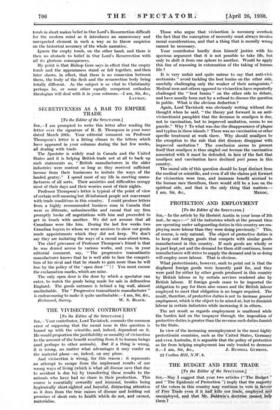PROTECTION AND EMPLOYMENT [To the Editor of the SPECTATOR.] the
article by Sir-Herbert Austin in your issue of 5th inst., he says :—" All the industries which at the present time are operating under safeguarding duties in this country are em- ploying more labour than they were doing previously." This, of course, is only natural. The object of protective duties is to keep out foreign goods that compete with "similar goods Manufactured in this country. If such goods are wholly or in part kept out and the demand for them still.continues, home inanufacttirers will strive to supply the demand and in so doing will employ more labour. That is obvious.
What Protectionists, however, omit to point out is that the "displaced foreign goods were honestly paid for, and they were paid for either by other goods produced in this country by British labour or by certain services rendered also by British labour. If foreign goods cease to be imported the obligation to pay for them also ceases and the British labour employed to meet that obligation is no longer required. The result, therefore, of protective duties is not to increase general employment, which is the object to be aimed. at, but to diminish labour in certain industries while increasing it in others.
The net result as regards employment is unaltered while the burden laid on the taxpayer through the, imposition of protective duties is greater than the revenue such duties furnish , to the State. . .
In view of the increasing Unemployment in 'the most highly protectionist countries, such as the United States, Germany and even Australia, it is arguable that.the policy of protection so far from helping employment has only tended to decrease




































 Previous page
Previous page